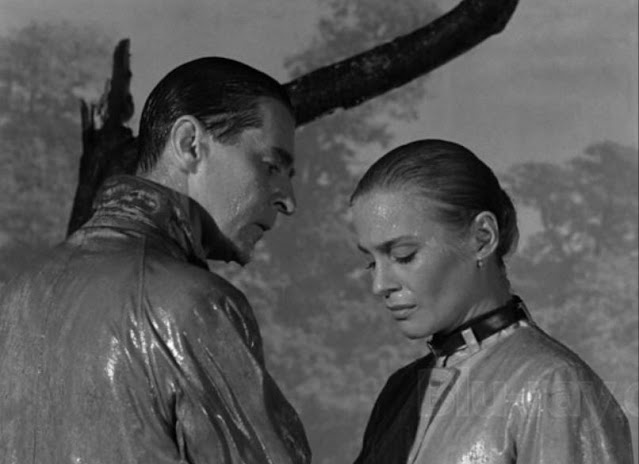Watched "Wild Strawberries" (1957) as an entry towards watching the works of Ingmar Bergman. While I first heard of him many years ago, through the praising words of the late Tissa Abeysekara, given my natural reluctance to sit and watch a movie, as against reading, I've postponed watching his works by almost a decade.
I will only share what I felt about the theme of the movie, given that am not capable of discussing the cinematography, therein.
The reference to coldness and loneliness takes a central theme of the movie. When Prof. Isak Borg visits his mother, she complains of the cold, which he doesn't feel. That cold is symbolic of the characteristic of the old lady, and is present in abundance in the old Prof. too, as his daughter-in-law, Marianne ( played by the beautiful Ingrid Thulin ), points out. Marianne has reason to be complaining, as she had detected that the cold of the mother, and the son, has manifested in to the third generation, via an unhappy marriage of the latter. The conversation between Marianne and her husband, whom she dearly loves, is one that would be almost craved for by those interested in Existentialism and Absurdism.
This soul searching journey happens on a certain day, where the old scholar visits his former University to receive a honorary degree. It is symbolic that however much knowledgeable the old scholar is, his education in life is incomplete, and the road trip that he decides to take on the day of the awarding of the degree, attempts to complete it. He receives it via dreams, a set of hitch hiking youngsters brimming with life - in total contrast to the moods of Marianne and Borg - whom they accommodate in their car, as well as a fighting husband and wife couple.
I've watched this movie twice over the last four days, and I might watch it again, as am now in that phase where all of sudden illumination of each event, beyond its apparent meaning.
To state the obvious, a brilliant movie that one can revisit many a time, and see inferred meanings and symbols, and thus more meaning with each visit.
I will only share what I felt about the theme of the movie, given that am not capable of discussing the cinematography, therein.
The reference to coldness and loneliness takes a central theme of the movie. When Prof. Isak Borg visits his mother, she complains of the cold, which he doesn't feel. That cold is symbolic of the characteristic of the old lady, and is present in abundance in the old Prof. too, as his daughter-in-law, Marianne ( played by the beautiful Ingrid Thulin ), points out. Marianne has reason to be complaining, as she had detected that the cold of the mother, and the son, has manifested in to the third generation, via an unhappy marriage of the latter. The conversation between Marianne and her husband, whom she dearly loves, is one that would be almost craved for by those interested in Existentialism and Absurdism.
This soul searching journey happens on a certain day, where the old scholar visits his former University to receive a honorary degree. It is symbolic that however much knowledgeable the old scholar is, his education in life is incomplete, and the road trip that he decides to take on the day of the awarding of the degree, attempts to complete it. He receives it via dreams, a set of hitch hiking youngsters brimming with life - in total contrast to the moods of Marianne and Borg - whom they accommodate in their car, as well as a fighting husband and wife couple.
I've watched this movie twice over the last four days, and I might watch it again, as am now in that phase where all of sudden illumination of each event, beyond its apparent meaning.
To state the obvious, a brilliant movie that one can revisit many a time, and see inferred meanings and symbols, and thus more meaning with each visit.


No comments:
Post a Comment